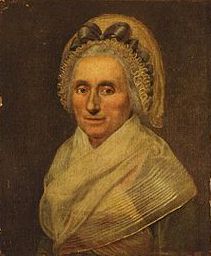|
 |

Part of the American
History & Genealogy Project |
Mary (Ball) Washington 1708 ~ 1789


Mary Ball Washington
Mary Washington, the mother of Washington, was descended from an
ancient family of note which emigrated from England in 1650, and
settled in Lancaster, Virginia, on the Rappahannock River. Mary,
the youngest child of her father, Joseph Ball, was born in 1706,
at Epping Forest, the family homestead, which he inherited from
his father, William Ball, the first emigrant. Joseph Ball was
made Colonel by Governor Spotswood in 1710, and known as Colonel
Ball, of Lancaster. Five years before that time he executed a
will in which is found the following:
"I give and bequeath unto my daughter, Mary, four hundred
acres of land in Richmond County, in ye freshes of Rappa-h-n
River, being part of a patten of 1,600 acres to her, ye said
Mary, and her heirs forever."
She was then five years old.
We also have the Ball coat-of-arms as follows:
"The escutcheon has a lion rampant, a coat-of-mail and a
shield bearing two lions and a fleur-de-lys. The crest is a
helmet with closed visor. Above the lion is a broad bar, half
red and half gold. On the scroll which belongs to it are these
words: 'Coelumque tueri.'
"When Mary was twenty-one her mother died, and she was taken by
her brother Joseph, a lawyer of London, to his home near that
city in 1728-29. In 1729 she met Augustine Washington, a son of
an eminent and wealthy family of illustrious English descent,
and described as "a stately and handsome gentleman." In the
prime of early maturity, a widower with two little sons, he had
come to England to look after an estate left him by his
grand-father. Renewing, it is supposed, a passing acquaintance,
he was captivated with Mary Bail and married her. They returned
to this country and to his Westmoreland plantation of Wakefield
on the Potomac, where George Washington, their son, was born
February 11, 1732. In 1735 their dwelling was burned to the
ground.
Instead of rebuilding upon the site of the old homestead,
Augustine Washington removed to his plantation "Pine Grove," in
Stafford County, upon the Rappahannock River, opposite
Fredericksburg, where he died August 12, 1743, aged forty-nine
years. They took him back to Westmoreland County, and laid him
in the family vault at Wakefield, and the widowed mother
returning to the home thus suddenly bereft of its honored head,
gathered about her the fatherless children and "took up with
both hands life as God had made it for her."
Her own five, and the two little lads who had been left to her
guardianship, with their several estates, were a burden and
responsibility to appall the stoutest heart; but she shrank not
from it, and so faithfully and judiciously did she carry the
burden, that she won and retained the affection and respect of
all till her life's end, turning over, with added value, the
shares of her step-sons' property when they arrived at maturity.
We know with what care and judgment she trained her own eldest
born for usefulness; how her wisdom and firmness kept him from
service on a British man-of-war, and saved him to his country.
The civil engineer of sixteen years of age soon became the brave
and successful soldier and officer, and defender and hope and
pride of his country, the great General who struggled through
eight weary years of war to its triumphant close. Early in the
struggle her son earnestly entreated her to leave her plantation
of "Pine Grove," and take refuge in the town for better
protection and safety, which she finally but reluctantly did,
establishing herself in a snug home near her only daughter,
Betty (Mrs. Fielding Lewis) where during those "weary eight
years" she labored incessantly with her servants in making
homespun clothing for the suffering soldiers, herself knitting
the stockings.
Her big Bible with its family record of births, marriages and
deaths, is now the precious possession of her descendant, Mrs.
Ella Barett Washington. On "Kenmore" the home plantation of her
daughter, rises a gentle eminence overlooking the valley of the
Rappahannock and the lovely amphitheater of hills rising from
it, where are clustered a mass of bold rocks sheltered by fine
old oaks looking towards her old home, "Pine Oak." This spot was
a favorite resort for the mother for meditation and prayer. The
hours spent there, her children and grand-children held sacred,
and never intruded upon. It is still venerated as "Oratory
Rock." On August 25, 1789, after a painful illness, in
unfaltering faith, she passed from earth and was buried at her
own request at this spot, sacred to her for all future time unto
the Resurrection Mom.
Though the life of Mrs. Washington was a changeful one, and had
its full measure of sorrow and joy, it affords little material
for the biographer. Yet, as someone said in writing about her
years ago, none who take an interest in the history of the
Father of this country, can fail to desire some knowledge of her
who shared his thoughts and plans, and was associated with him
in the great events of his life. And, indeed, few women have
been called to move in the drama of existence amid scenes so
varied and imposing; and few have sustained their part with so
much dignity and discretion. In the shades of retirement or in
the splendor of eminent station, she was the same
unostentatious, magnanimous woman. Through the gloom of adverse
fortune she walked by the side of the chief, ascending with him
the difficult path that had opened before him, and at length
stood with him on the summit, in the full light of his power and
renown.
Women of
America

Source: The Part Taken by Women in
American History, By Mrs. John A. Logan, Published by The Perry-Nalle
Publishing Company, Wilmington, Delaware, 1912.
|